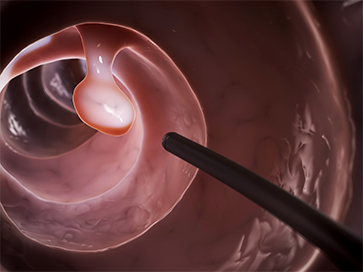
Complex Colon Polyps Treatment in Colorado
We Specialize in Digestive Tract Diseases & Disorders
Rocky Mountain Gastroenterology provides complex colon polyp treatment to Colorado residents. If you’re suffering from a digestive tract disease or disorder, we can help. We boast an unwavering commitment to providing appropriate and cost-effective healthcare services and performing a wide range of procedures. Read on to learn more about complex colon polyps and the treatment options.
What Are Colon Polyps?
Colon polyps, also known as rectal polyps, are small clumps of cells that develop in the colon’s lining and are typically discovered during a colonoscopy. Most often, colon polyps are harmless. But over time, they are capable of developing into colon cancer. Colon cancer can become fatal if not found in its earlier stages. It’s possible for anyone to develop colon polyps, but your risk of having them increases if you are older, overweight, a smoker, or have a family history of them.
What Are Complex Colon Polyps?
When the colon polyps are too large to remove safely during a colonoscopy, they are considered complex colon polyps. Complex polyps are typically either larger than two centimeters or are in a difficult location to remove safely. Some complex colon polyps progress to colon cancer or can be considered precancerous. Large complex colon polyps can be removed either through surgery or by advanced polypectomy techniques from an RMG-board-certified gastroenterologist.
What Causes Colon Polyps?
Polyps in the large intestine are caused by mutations in certain genes that result in cells dividing when new cells aren’t needed. These unregulated growths can cause polyps to develop.
The Signs & Symptoms of Colon Polyps
Most of the time, colon polyps won’t cause symptoms. Because of this, it’s important to undergo regular screenings, such as a colonoscopy. During a colonoscopy, if you have colon polyps and they are found in their early stages, they can often be safely removed. However, for those that do experience symptoms of colon polyps, they may notice any of the following:
- Pain
- Rectal bleeding
- Change in stool color
- Change in bowel habits
- Iron deficiency anemia
Treatment for Complex Colon Polyps
Treatment options for complex polyps include endoscopic mucosal resection, endoscopic submucosal dissection, or endoscopic full-thickness resection. There are various available colon polyps treatments, but the most common is surgery. Surgical approaches include robotic surgery or transanal surgery. During these surgical procedures, your colorectal surgeon will remove any complex colorectal polyps. Sometimes, a combined endoscopic and laparoscopic approach is used.
Contact Us About Complex Colon Polyps Treatment
With various types of colon polyps that one can develop, it can feel worrisome, but it doesn’t have to. The professional team at Rocky Mountain Gastroenterology has you covered. If you’re experiencing any pain, rectal bleeding, change in stool color, change in bowel habits, or iron deficiency anemia, reach out to our team as soon as possible. You may be experiencing colon polyp symptoms. This condition is capable of severely diminishing the quality of one’s life. To learn more or to request an appointment, contact our highly-experienced team today. We look forward to managing your gastrointestinal care.
Go back